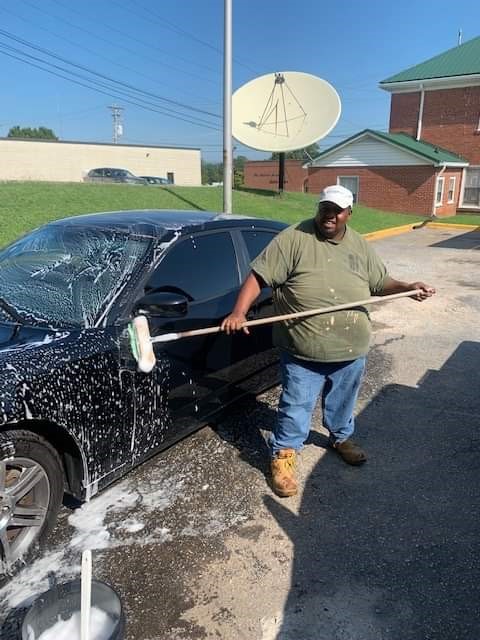As of May 2022 our bill to end subminimum wage and bring Employment First to SC was signed into law! Learn more here.
What is subminimum wage?
Subminimum wage is when people with disabilities are paid LESS than the minimum wage of $7.25 per hour. Sometimes, this is pennies on the dollar. Since 1938, section 14(c) of the Fair Labor Standards Act has allowed employers who have obtained a certificate to pay certain employees less than the federal minimum wage, based on the perceived impact the employee’s disability has on their ability to perform the job.
Although the Americans With Disabilities Act, passed in 1990, protects people with disabilities from employment and pay discrimination, there continues to be a loophole in the system due to the 1938 federal law that harms and discriminates against people with disabilities. The law was established in a time when no opportunities were available for individuals with disabilities. Since then, there have been protections put in place for workers with disabilities, including the Rehabilitation Act of 1973 and the Americans with Disabilities Act and several advancements in vocational rehabilitation, technology, and training. Also, many businesses across the US have adopted inclusive hiring and advancement practices.
Why do employers pay people with disabilities subminimum wage?
Many subminimum wage employers and “employment training centers” engage in problematic practices, benefitting from both Medicaid funding and business contracts, while paying the workers with disabilities who perform the work less than minimum wage. According to a report issued by the U.S. Commission on Civil Rights, the U.S. Department of Labor has repeatedly found 14(c) providers limiting people with disabilities participating in the program from realizing their full potential while allowing providers and associated businesses to profit from their labor.
These findings show that 14(c) programs are not working the way they were intended. Continued failures in regulation and oversight by government agencies, such as the Department of Labor and Department of Justice, have allowed the program to operate without satisfying its goal of setting people with disabilities up for employment success in the competitive economy.
How many people in South Carolina are being paid less than minimum wage?
In the beginning of 2020, there were over 2,900 people being paid less than minimum wage. However, this number fluctuates as applications for 14(c) certificates are submitted and approved. Since the pandemic, the number of individuals with disabilities have significantly decreased as nearly 1,000 people are being paid less than minimum wage. This is the perfect time to pass a bill to end subminimum wage, before anyone else is grandfathered into the 14(c) program.
People with significant disabilities and their families are often told that there are no other options available to them, and are often pressured by public systems and service provider agencies to enter into this option.
Why was a law for subminimum wage passed in the first place?
The law was established in a time when no opportunities were available for individuals with disabilities. While the law might have intended for 14(c) programs to be a place where people with disabilities can learn employment skills and soon transfer to competitive, integrated employment, this is not what happens.
What are sheltered workshops like?
Sheltered workshops, often referred to as “work activity centers,” are typically in a warehouse type of setting. There are different stations where people with disabilities typically perform repetitive tasks, like placing screws in small plastic bags or packaging disposable forks and spoons. They do not work alongside their peers without disabilities, and they are paid subminimum wage. They are often not taught or held to expectations of professionalism, like staying on task, which can make it difficult for them to adjust when they do try to transition to work in the community. If the workshop does not have any contracts, there may be no work for them to do at all. In these instances, they may be bored and unengaged.
Unfortunately, in South Carolina individuals with disabilities are still unjustifiably segregated in state-provided services, such as career preparation and employment services. Some spend all day interacting only with other similarly segregated individuals. These services might be called “career preparation” or “employment services,” as if they are a stepping-stone to more meaningful, challenging work. In reality, individuals are stuck in these dead-end services for years.
Many of the venues where these services are provided are sheltered workshops, so called because they are “sheltered” from laws defining the minimum wage. Individuals will be stuck for hours a day, for years on end, performing repetitive tasks, which teach them no meaningful job skills, while being paid far less than the federal minimum wage. Additionally, people with disabilities have faced various forms of abuse and neglect at these sheltered workshops, such as a woman who was left and locked in a bus for 2 consecutive days in 90 degree weather.
For more information, please see the report “Unjustified Isolation, Unwarranted Assumptions: Why South 16 Carolina’s System of Sheltered Employment Services Needs to Change” from Disability Rights South Carolina. It is problematic enough that people would be paid a wage on which it is impossible to support themselves, but people in these settings can also be denied the right to receive unemployment benefits or workers’ compensation for on-the-job injuries.
How long do people with disabilities work in sheltered workshops?
Unfortunately, people are often stuck in these settings for many years. Below are a few stories of people with disabilities who had worked in these settings until other providers in South Carolina assisted them with reaching their goals of working in the community.
Meet Angela:

Angela was in a sheltered workshop from 1994-2015. She worked Monday-Friday making about $3 per hour. She always believed that community employment was possible, but she didn’t have the support to achieve employment. In 2015 she moved, and the new agency that provided her services quickly worked to help her get employment in the community. They believed in her and took a chance on her. She has worked in the community for the past 6 years and is currently working at the University of South Carolina as a dining room attendant, working 20 hours a week.
“I regret being in the sheltered workshop,” Angela said. “I was there for 21 years but now I have worked in the community for 6 years. Working is important to me. Working has helped me be more independent.”
Isn’t it fair for people with disabilities to be paid less if they work slower than their peers and produce less?
No, people with and without disabilities may perform their job at lower or higher production rates. However, if people with disabilities are provided with reasonable accommodations under the Americans with Disabilities Act, they can perform the essential duties of the position.
Ending subminimum wage is not about paying individuals for work they did not do. People with disabilities do not want special treatment. Most sheltered workshops focus on production or assembly type work, even if this is not the type of work the individual wants to do. There is a lack of choice, and their rate of pay is based on doing a job that may or may not suit them. People with disabilities, like those without disabilities, deserve the opportunity to pursue jobs related to their interests and skill sets, where they can thrive and bring value to their employer. Oftentimes, the solution involves finding the right fit in the community, providing the appropriate training, and supplying reasonable accommodations to perform the necessary tasks.
If subminimum wage is ended, does that mean those people with disabilities will be out of a job?
No, and we would never allow that to happen. In South Carolina, the bill would not take effect until August 1, 2024, to allow time to develop a plan to successfully transition workers to other types of employment. We believe a three year transition, which provides support for both providers and participants and is grounded in the values of informed choice and equal rights, is a positive path forward. The two year transition plan to end subminimum wage in SC will ensure a meaningful transition for the individuals receiving subminimum wage and promises that no one will be left behind.
What if a person with a disability isn’t able to hold a “real” job?
First, a person’s value should not be determined by whether or not they can work. There are a lot of ways to be involved in the community outside of employment. However, incorrect assumptions are made all the time about the ability of people with disabilities to work. As a society, we must address the attitudinal barriers that still exist for people with disabilities. The Americans with Disabilities Act (ADA) protects people with disabilities from discrimination but low expectations and assumptions about what a person can and cannot do based on their disability still exists. People with disabilities just want equal access to employment opportunities and subminimum wage keeps them from achieving that.
For example, meet Abe:

Abe started in a sheltered workshop right out of high school and stayed there for 27 years. Over a year ago, he was able to transition into community employment, working at the local sheriff’s department. He has done such a great job that he was featured on the sheriff’s department’s Facebook several times. Getting a job in the community has allowed Abe to be more financially stable and independent. He was able to move from a community living home to living independently in his own apartment.
There are all kinds of innovative strategies and accommodations to help people with disabilities, even those with significant support needs, find and maintain employment. South Carolina needs to make sure those providing employment supports and services are well-trained on evidence-based practices that can support individuals with disabilities in finding employment in the community for real pay.
I’m a person with a disability (or a caregiver of a person with a disability), and I’m not sure what kind of employment opportunities are available to me. What should I do?
People with disabilities are just as capable of working and participating in the community as anyone else, if they are provided with the support and reasonable accommodations they may need to do the job. Resources like Hire Me SC and Able South Carolina can help you discover your career interests and search for employment.
Are there any efforts on the federal level to end subminimum wage?
There are significant efforts to end subminimum wage occurring on the national level due to the practice being discriminatory. There are policies being introduced to phase subminimum wage out completely and we see South Carolina being proactive with this practice so we can appropriately develop a strong plan. Disability rights organizations and disability led organizations have been advocating to phase out subminimum wage for decades. Several states and some cities have restricted the use of subminimum wage and South Carolina should be the next state to do that as many providers statewide are practicing competitive and integrated employment for people with disabilities. Vermont became the first state to end subminimum wage, in 2002.